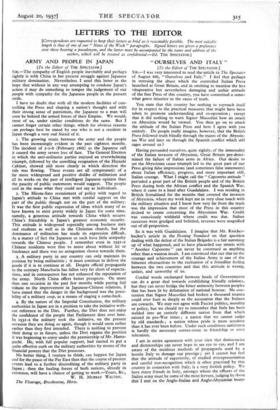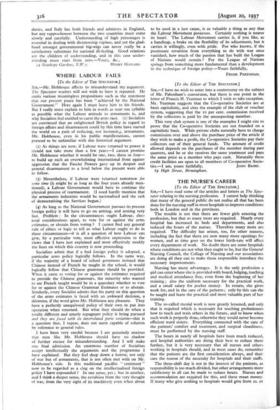" OURSELVES AND ITALY "
[To the Editor of THE SPECTATOR.] SIR,-I was very interested to read the article in The Spectator of August 6th, " Ourselves and Italy." I feel that perhaps in stressing the abuse which the controlled Italian Press launched at Great Britain, and in omitting to mention the less vituperative but nevertheless damaging and unfair attitude of the free Press of this country, you have committed a some- what grave injustice to the cause of truth.
You state that this country has nothing to reproach itself for in respect to the practical measures that might have been taken to promote understanding and co-operation ; except that it did nothing to warn Signor Mussolini how an attack on Abyssinia would be viewed. You then go on to attack the attitude of the Italian Press and here I agree with you entirely. Do people really imagine, however, that the British Press followed truth blindly through the mazes of the Abyssin- ian War and later on through the Spanish conflict which still rages around us ?
Having persuaded ourselves, quite rightly, of the immorality of the Italian invasion of Abyssinia, Great Britain pre-deter- mined the failure of Italian arms in Africa. Our desire to see the Abyssinian cause triumph led to the great part of our Press giving false impressions (and sometimes false statements) about Italian efficiency, progress, and more important still, Italian courage. What I might call the " Caporetto attitude " pervaded a great part of the British people and of the British Press during both the African conflict and the Spanish War, where it came to a head after Guadalajara. I was residing in British Somaliland for the months that covered the invasion of Abyssinia, where my work kept me in very close touch with the military situation and I know how very far from the truth was the impression that most of the Press in this country desired to create concerning the Abyssinian War. Credit was consciously withheld where credit was due. Italian successes were grudged and belittled, reverses were magnified out of all proportion.
So it was with Guadalajara. I imagine that Mr. Knicker- bocker's article in the Evening Standard on that question dealing with the defeat of the Italian Brigades is a fair summing up of what happened, and to have placarded our streets with. " Another Caporetto " can never be construed as anything other than a wanton insult. I am convinced that our slur on the courage and achievement of the Italian Army is one of the bitterest obstructions to the realisation of a friendlier feeling between the two countries and that this attitude is wrong, unfair, and unworthy of us.
Cordial words exchanged between heads of Governments can do a great deal towards establishing friendly relations, but they can never bridge the bitter animosity between peoples that has been lit by defamation of national honour. No con- tention that Signor Mussolini had broken a thousand treaties could ever hurt as deeply as the accusation that the Italians are cowards. We may not agree with Fascist politics, morality or policy, but we should try to remember that Italy has been welded into an entirely different nation from that which existed in pre-War times ; a nation that we cannot judge by old standards ; a nation whose pride is more sensitive than it has ever been before. Under such conditions unfairness is hardly the necessary corner-stone to friendship or even toleration.
I am in entire agreement with your view that democracies and dictatorships can never hope to see eye to eye, and I am aware of the insidious methods of propaganda used by a hostile Italy to damage our prestige ; yet I cannot but feel that the attitude of superiority, of studied misrepresentation and careful non-recognition which is often practised by this country in connexion with Italy, is a very foolish policy. We have many friends in Italy, amongst whom the officers of the Italian army must be some of the most fervent, judging by those that I met on the Anglo-Italian and Anglo-Abyssinian boun- daries, and Italy has both friends and admirers in England, but any rapprochement between the two countries must come slowly and carefully. Understanding of high personages is essential in dealing with dictatorship regimes, and yet the glad- hand amongst governmental big-wigs can never really be a satisfactory substitute for national ill-feeling. Good relations are the children of understanding, and in this case under- standing must start from zero.—Yours, &c., 24 Stanhope Gardens, S.W.7. HENRY HOWARD.







































 Previous page
Previous page